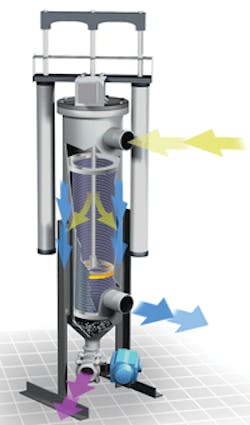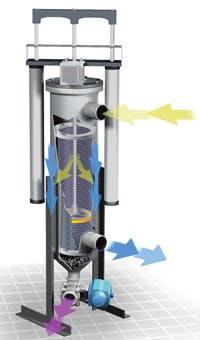Beefing Up Conservation: Filtration System Helps Meat Packing Company Curb Water Consumption, Support Sustainability
Perhaps more so than in any other area of the United States, water is the lifeblood for social and economic wellbeing in the essentially arid state of California.
As such, numerous legislative initiatives have been implemented over the years to better conserve water, covering everything from installing more efficient sprinklers to planting drought-tolerant landscaping to upgrading some 10 million public and private toilets.
Challenge
A major meat packing company in California was using a substantial amount of water, and the state was raising concerns about its consumption.
In order to help curb its water usage, the meat packing company sought recommendations from Eaton's Filtration business on how to more efficiently reuse and recycle water at one of its facilities in central California.
Engineers at the company and Eaton representatives eventually identified one area of the processing -- known as a hide-on wash station -- where water usage was especially high. They concluded that recycling the rinse water at these stations would significantly reduce consumption.
However, recycling the rinse water required an especially robust filtration system due to the extremely harsh operating conditions at a hide-on station, where the filters had to handle high quantities of dirt, hair, fats, and other impurities. High flow rates further complicated the formidable task.
Solution
The problem was soon solved with the installation of three Eaton DCF-1600 filters with twin pneumatic actuators.
"We were asked to make a recommendation on the conditions we saw during a site visit," said David Peterson, regional sales manager for Eaton. "Based on what I witnessed, no other filter was capable of handling the severe operating environment."
Ideal for a variety of food applications, Eaton DCF-1600 filters are designed for the rigors of processing highly viscous, abrasive, sticky, or otherwise hard-to-process
substances. The filters, which operate at low differential pressure, easily accommodate a wide range of flow and retention requirements.
Additional features include:
- Elimination or reduction of disposable filter bags and cartridges for reduced operator handling, inventory costs and landfill waste
- Reduction in product loss and more thorough containment purge in a highly-concentrated waste stream
- Reduction or elimination of operator intervention for safer operation
- Virtually maintenance-free operation with nearly 100-percent uptime
- Compact design and lower capital cost to fit most installations
- Stainless steel screens ranging from 15-micron slots to 1/4-inch perforations to handle a wide range of filtration needs
- Availability with most popular cleaning discs
The dual actuators on the DCF-1600 filters isolate the actuation mechanism from the filtrate with a bridged system, resulting in a long operating life in nearly any challenging condition.
Results
"The systems have been operating perfectly from the day they were installed," said Peterson, "and the savings from water conservation have been huge."
Because of the amount of water being conserved, the company should also be in compliance if future restrictions for incoming water are imposed -- something that has occurred in California in the past due to ongoing water shortages. Meanwhile, discharged wastewater has been effectively minimized with the reuse of recycled water.
Visitors from sister facilities have observed the DCF-1600 filters operating in California and have been motivated to investigate ordering their own installations, added Peterson.
"Water reuse and recycling in the food processing industry is a recurring challenge," he said. "Thankfully, there are many areas where water can be filtered and reused with the right filtration system, including incoming water from wells, as well as water used in wash stations, cooling towers, storage tank cleaning, and more."

